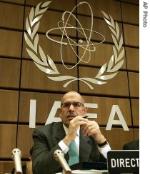2007年VOA标准英语-US Ponders Next Steps Toward Iran
搜索关注在线英语听力室公众号:tingroom,领取免费英语资料大礼包。
(单词翻译)
By Bill RodgersWashington
22 August 2007
The International Atomic Energy Agency's next progress report on Iran's disputed nuclear program could very well determine whether the U.N. Security Council imposes a third set of sanctions against Tehran. The IAEA report is expected in early September. But in Washington a debate is raging now over whether diplomacy2 has run its course and if bolder action is needed to block Iran's nuclear and regional ambitions. More from VOA's Bill Rodgers.
 |
| IAEA Director General Mohamed ElBaradei |
The IAEA's conclusions on whether Iran is being more transparent3 may determine support for U.S. efforts to impose additional sanctions on Iran.
John Calabrese is an Iran expert at the Middle East Institute in Washington. "If the IAEA report delivers a view or a set of findings that indicates that Iran has been uncooperative, then I think this builds a case for the United States politically to do, what at least some in the administration appear determined4 to do, which is to ratchet up the sanctions."
 |
| John Calabrese |
The hawks5 point out that despite U.S. Secretary of State Condoleezza Rice's offer more than a year ago to talk to Iran, little progress has been made on the nuclear issue or in stopping Iran's Revolutionary Guards from supplying weapons to Iraqi insurgents6. The former U.S. ambassador to the U.N., John Bolton, is among those advocating a much tougher stance.
 |
| Patrick Clawson |
For now, imposing10 tougher U.N. sanctions on Iran appears to be the Bush administration's priority. In March, the Security Council voted to freeze the overseas assets of certain individuals and organizations involved in Iran's nuclear program.
State Department spokesman Sean McCormack says the administration continues to view such measures as a valuable tool. "They have the force of international law. And more and more, you have seen a cloud gathering11 over Iran and its dealings with the international financial community and the international business community."
But Iranian leaders may decide they have nothing to lose by waiting out the remaining 17 months of the Bush administration -- a move John Calabrese believes could be risky12. "The administration's own time in office and its own difficulties politically may send a signal to the Iranians that they can stall, and they can buy time, and they can just wait us out. And the wild card here is the degree of patience or sense of urgency that the administration has, or doesn't have, and the point at which they may feel compelled to take more coercive steps."
And the Bush administration has made clear it will not "tolerate" a nuclear armed Iran.
 收听单词发音
收听单词发音 




